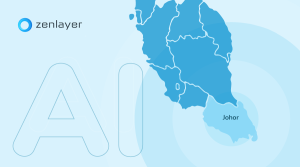
Today, enterprises large and small across all industry verticals are leveraging colocation for secure data storage and business scalability.
As more of these companies look to expand globally and increase data infrastructure investment, location emerges as an important factor in choosing a data center facility – especially when latency-sensitive digital content is involved.
The top global colocation markets are expected to offer dense fiber and robust telecommunications, reliable utility power and stable economic conditions. According to Cloudscene, the top five markets are London, Frankfurt, Amsterdam, Washington D.C. and Hong Kong, where Zenlayer offers colocation services.
Let’s take a closer look at these five colocation markets.
London
London remains the largest of the four top European data center markets with 38 percent market share and more leased capacity than any of the other European markets.
Due to increased usage of applications powered by cloud service providers, demand will continue to be strong and the city is expected to maintain its dominance in the European data center market.
Brexit is coming into force in May, but Data Center Knowledge says there has been no negative effect on London’s data center market thus far. Nevertheless, for regulatory purposes clients may want to consider implementing a dual-location strategy or migrating to continental Europe, depending on their IT strategies and unique business requirements.
Frankfurt
Frankfurt is the leading European center for financial services and the home of Deutscher Commercial Internet Exchange (DE-CIX), an important Internet exchange point that offers 6 Tbps peak traffic.
Centrally located, Frankfurt routes most of Europe’s Internet traffic and serves as a convenient facility buildout to regional markets in southern and eastern Europe.
Its legal protection laws and stringent data protection regulations translate to high user confidence in data privacy. However, this combined with high power costs can create additional operational overhead for hosting providers and create barriers to entry for international enterprises. Thus, choosing a colocation provider to lower costs and ensure data ownership and transfer compliance is recommended.
Amsterdam
Amsterdam is home to many startups and tech companies and offers a robust tech ecosystem. In fact, the city is set to become one of the top three most innovative regions in Europe by 2025, according to Amsterdam Economic Board.
The city directly connects Europe to North America with the most transatlantic subsea cables and world-class subsea cable connectivity. Additionally, it houses AMS-IX, the world’s leading internet exchange, connecting over 350 cities and 500+ colocations.
Leading MNCs including Netflix, Facebook and Salesforce have chosen to set up their European headquarters in Amsterdam, perhaps because the highly skilled multilingual workforce makes it easier to conduct cross-border business.
Washington D.C.
Ashburn, just 30 minutes outside of Washington D.C., routes 70 percent of the world’s Internet traffic flow and has seen an influx of new players and investors as cloud computing growth continues to drive colocation demand.
The region is seismically stable compared to Silicon Valley and close in proximity to government agency headquarters, which plays a role in the region’s world-class network connectivity. In addition, it offers favorable tax policies and the lowest commercial electricity rates in the Mid-Atlantic; the typical power rate paid by Northern Virginia data centers is 28 percent below the national average.
CoreSite Eastern Region Vice President, Juan Font, said that land is the only limiting factor in Ashburn that he can think of, as the fiber, ecosystem and plethora of providers in this region are extremely attractive.
Hong Kong
Hong Kong, one of the most important markets in Asia, attracts many mainland Chinese cloud and technology companies that are pursuing international expansion. Chinese Internet giant Tencent expanding overseas through Hong Kong’s data centers is just one example.
On the flip side, Hong Kong’s data centers also draw many U.S.-based companies looking to gain a foothold in APAC, largely because it serves as a leaping point for them to expand into mainland China. With Chinese data localization laws in place, Hong Kong’s data centers provide an alternative way to store data close to mainland China.
Currently, the financial services industry represents the largest customer base in Hong Kong, but future catalysts for growth will comprise of companies in IT, cloud services, telecommunications and digital media.
With a global footprint of 90 data centers providing secure, high-availability colocation services, Zenlayer’s colocation services help save you the cost, complexity and commitment of running your own facilities.
To discuss which colocation markets make the most sense for your projects and applications, contact Zenlayer today.






